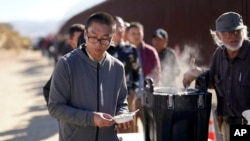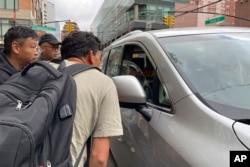After more than two years of separation, Chinese migrant Duan Chunxia, 51, recently met face to face with her husband and daughter at Stewart Detention Center, a U.S. Immigration and Customs Enforcement facility in Georgia.
“My wife has lost a lot of weight, and her hair turned gray,” her husband, Ni Jinfang, told VOA Mandarin in an emotional video interview. “Our daughter cried so much when she saw her mother. Her tears were all over her face and neck.”
That tearful reunion on December 1 was the latest in an emotional roller-coaster ride for the family as they’ve separately come to the United States seeking political asylum.
Following the COVID-19 pandemic, there was a surge in Chinese nationals entering the United States illegally and seeking asylum. Over the past year, those numbers have dwindled, and U.S. authorities are stepping up efforts to send a growing number back to China.
There is also increasing concern among undocumented migrants from China about President-elect Donald Trump’s pledge to carry out mass deportations.
Deportation flights
Just days after Duan met with her family, she was scheduled to be sent back to China on a U.S. government-chartered removal flight.
That flight departed Monday, but Duan was not on it. Following a second asylum interview, authorities agreed to give her more time to appeal the deportation order.
The charter flight marked the fourth time in six months that the United States has deported undocumented migrants back to China. Three previous flights in June, October and November carried a total of at least 350 Chinese citizens back to their homeland.
The last previous large-scale repatriation occurred in 2018.
Growing cooperation
In a statement Wednesday, the U.S. Department of Homeland Security (DHS) said the flight “is yet another example of the department’s ongoing cooperation with [China] and other international partners to deter irregular migration.”
It added that DHS and its counterparts in China “also continue joint work to counter the human smuggling networks that facilitate irregular migration.” DHS did not say how many migrants were on the flight.
Chen Chuangchuang, an immigration lawyer in California, told VOA Mandarin that the Chinese and U.S. governments have cooperated more closely on immigration issues this year than previously.
"In the past, China rarely cooperated with the U.S. government in accepting illegal migrants,” Chen told VOA in a December phone interview. “China has recently exchanged prisoners with the U.S. many times and also accepted undocumented people. [Chinese leader] Xi Jinping calls it ‘law enforcement cooperation’ rather than ‘border and immigration issues.’ ”
How they arrived
Ni, 53, and the couple’s 18-year-old daughter entered the U.S. on tourist visas in 2022. After Duan’s husband and daughter left China, she applied for a tourist visa the following year, but her application was rejected.
More than one year after that, in late September, she illegally entered the U.S., crossing the southern border with Mexico.
Duan made the hazardous journey through Ecuador and then traveled overland through Colombia, Central America and Mexico to the U.S. border.
Both Duan and Ni are from China’s central city of Suzhou, just outside Shanghai. The city is relatively wealthy but human rights violations are not unheard of.
In 2012, Ni lost his house and land following a government-led forced demolition. He tried to sue the local government in 2013 but was not given a chance to file his lawsuit. He continued to petition the government without result. In 2016, Ni was assaulted by local police officers and put in jail for 171 days for the crime of "disturbing public order."
Ni continued to speak against the Chinese government after coming to the United States and participated in a protest in San Francisco last November, when Xi visited the city for the APEC summit and met with U.S. President Joe Biden.
Panicking
Another Chinese immigrant who entered the United States last year via the same route as Duan and is now living in New York state spoke with VOA on the condition that his name not be used because of his undocumented status.
In a telephone interview, he said that with the recent deportations and Trump’s pledges, many in the Chinese immigrant community are a little panicked.
"After he takes office, everyone will be worried about being deported, not just us illegal immigrants,” he said. “The ones with green cards, aren’t they afraid, too?"
Before entering the United States, this man said he had openly criticized Xi on Chinese social media. He said that if he is deported, he will undoubtedly face a prison sentence in China.
The man, who is in his 30s, has already begun applying for political asylum and is still hopeful.
“Although I don't like this result [Trump's victory], this is the choice of the American people, and there is nothing I can do. We are all entering an uncertain era, and everyone's future is uncertain,” he said.
Immigration lawyer Chen said that Chinese immigrants in the U.S. who have not yet obtained legal status do face a “real threat.”
“The Republicans have already occupied both houses [of Congress], and conservatives also have a clear advantage in the Supreme Court," he said. "We can say with absolute certainty that the second Trump administration will have way more resources, in terms of manpower, law and finances, to support the implementation of his deportation plan. This is bound to happen.”
However, Chen does not think that all Chinese immigrants who apply for asylum will be unsuccessful.
“For those who have a deportation order, if you have a legal reason to apply to stay in the U.S., there is still a chance for review. It’s not easy though. The standard will be raised,” Chen said, adding that individuals need to prove that they will be persecuted if they return to their home country.






